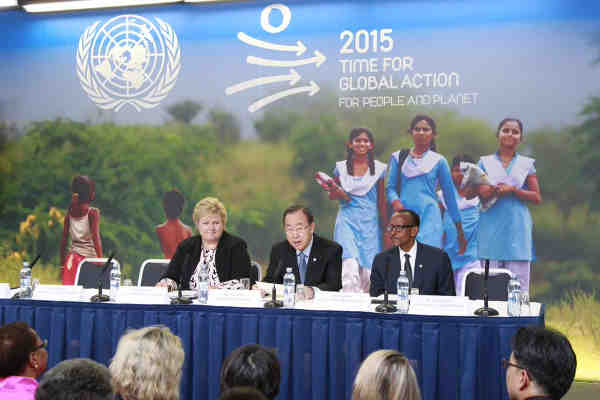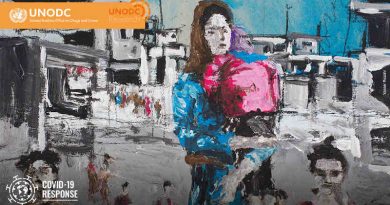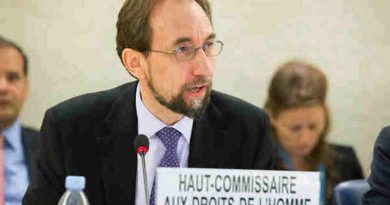What Are the Lessons from Millennium Development Goals?

The United Nations Millennium Development Goals (MDGs) galvanized the world to produce the most successful anti-poverty movement in history, helped lift more than one billion people out of extreme poverty, made inroads against hunger and enabled more girls to attend school than ever before. However, despite remarkable gains, it will take more to ensure the poorest and most vulnerable people are not left behind.
This is according to the final assessment of the MDGs, which range from halving extreme poverty rates to halting the spread of HIV/AIDS and providing universal primary education, all by the target date of 2015.
“The report confirms that the global efforts to achieve the Goals have saved millions of lives and improved conditions for millions more around the world,” Secretary-General Ban Ki-moon said at the launch of the report in Oslo, Norway.
“These successes should be celebrated throughout our global community. At the same time, we are keenly aware of where we have come up short,” he added.
Data and analysis prove that even the poorest countries can make dramatic and unprecedented progress with targeted interventions, sound strategies, adequate resources and political will, says the report, which reflects the global and regional progress of the eight MDGs over the past 15 years that has been monitored and analyzed annually by data compiled by more than 28 UN and international agencies.
The report – whose launch coincides with the opening in New York of the high-level segment of the 2015 session of the UN Economic and Social Council (ECOSOC) and the three-day Ministerial Meeting of the High-level Political Forum on Sustainable Development – found that the 15-year effort to achieve the Goals “was largely successful across the globe,” while acknowledging shortfalls that remain.
Important Note
While the UN report claims that the 15-year effort to achieve the Millennium Development Goals “was largely successful across the globe,” you must take everything that the UN claims with a pinch of salt. The picture is not rosy at all as the UN tries to paint. The world is full of misery and pains. The UN is not doing any good for the world’s downtrodden.
The UN justifies its existence by releasing such frivolous, armchair reports which conceal more than what they reveal. You cannot vet the authenticity of these reports.
Moreover, the UN Secretary-General and other top UN officials are doing nothing to stop terrorism and other crimes except issuing statements which are utterly useless and meaningless. The UN officials are concerned only about their own luxurious lifestyles.
In the given situation, the UN member countries must challenge the role of this intergovernmental organization and stop financing it. All the funds given by the member states are being squandered by the UN which is now overstaffed with unskilled officials. Believe me, the UN has lost its relevance.
Breaking down the progress made on each of the eight MDGs, the report found that:
On Goal 1 – eradicate extreme poverty and hunger – the world has seen the most successful anti-poverty movement in global history, which has contributed to a reduction in the absolute number of people living in extreme poverty by more than half in 2015 since 1990;
On Goal 2 – to achieve universal primary education – in sub-Saharan Africa, the implementation of the MDGs has helped increase the primary school net enrolment rate by 20 percentage points since 2000, compared to only 8 percentage points between 1990 and 2000, and the MDGs achieved ground-breaking success in the number of out-of-school children of primary school age, from 100 million in 2000, to 57 million in 2015;
On Goal 3 – which sought to promote gender equality and empower women – women are now having significantly stronger representation both in parliaments around the world and as a workforce outside of the agricultural sector and substantial achievements have been made in gender equality in education. For instance in southern Asia, there are now even more girls than boys enrolled in primary school, as compared with 74 girls for every 100 boys in 1990;
On Goal 4 – to reduce child mortality – the MDGs were most successful in the reduction of child mortality. Between 1990 and 2015, the annual rate of reduction of under-five mortality has more than tripled globally;
On Goal 5 – to improve maternal health – with the help of the MDGs, more mothers can rely on the assistance and treatment they need during pregnancy and after, and the maternal mortality ratio has been reduced by nearly half worldwide. Nowadays three-quarters of births are assisted by skilled health personnel globally;
On Goal 6 – to combat HIV/AIDS, malaria and other diseases – lower infection rates of HIV of 40 per cent, an immense increase in antiretroviral therapy, tremendous declines in malaria deaths and incidence rates as well as superior success in tuberculosis treatment prove that the MDGs work to defeat diseases;
On Goal 7 – to ensure environmental sustainability – the MDGs have significantly increased access to improved drinking water for more than 90 per cent of the global population, and since 1990, ozone protection efforts have virtually eliminated ozone depleting substances;
Goal 8 – to cultivate a global partnership for development – official development assistance (ODA) from developed countries increased by 66 per cent in real terms between 2000 and 2014.




